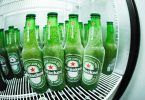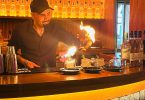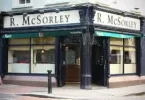2020’s household alcohol bill up €500m

Spending on Alcoholic Beverages (purchased for home consumption) rose by €488m (up 22.0%) to reach €2.696 billion in 2020.
The publication analyses the economic impact of the Covid-19 pandemic on citizens and enterprises up to half way through 2021 compared with the time period immediately before the pandemic.
As well as changes to working and earning patterns, the pandemic also brought about differences in the spending habits of Irish consumers. Household expenditure on goods and services fell by €10 billion in 2020 compared to 2019, a drop of 10%. But the biggest impact was household spend on Restaurants and hotels which fell by €6.5bn, according to the report. However spending on Alcoholic beverages (purchased for home consumption) rose by €488m (up 22.0%) to reach €2.696 billion.
But while many categories of household expenditure showed decreases in 2020 compared with 2019, Alcoholic beverages (purchased for home consumption) figured among the few that showed a rise in sales.
Household expenditure on Restaurants and hotels fell by 39.9% during 2020. This decline in spend by households is reflected in the severe fall in sales volumes of Bars throughout 2020 which had to close due to Covid-19.
As the pandemic continued and public health restrictions were reintroduced in Quarter 1 of 2021, the volume of sales recorded by Bars was down 89% on the same period of 2020.
“Although the volume of Bar sales increased in Q2 2021 compared with Q2 2020, sales volumes were still less than a quarter (23.0%) of the same period pre-pandemic (2019),” reports the CSO.
The CSO’s Consumer Price Index shows that the highest percentage increase in prices between 2019 and 2020 was 3.0% in Education, followed by Health at 2.8%. There were also price increases of 2.4% for Alcoholic beverages and tobacco between 2019 and 2020.
“The Recreation & culture and Restaurants & hotels commodity groups recorded price increases of 1.4% and 1.1% respectively in 2020,” reports the CSO, “These price increases coincided with large falls in household spending on Recreation & culture and Restaurants & hotels related goods and services and many employees in both sectors availing of government income supports.”
Employment
More than one in five of those receiving the Pandemic Unemployment Payment between March 2020 and the 29th of August 2021 were employed in Accommodation and food service activities.
Many economic sectors experienced falls in employment throughout 2020 but the largest percentage decreases were in Accommodation & food service activities, with falls of 39.1% in the year to Q2, 22.4% in the year to Q3 and 30.4% in the year to Q4, according to the report.
CSO Statistician Brian O’Mahony pointed out that Accommodation & Food Service Activities had close to a third fewer employees.
The figures for employment in the Accommodation and Food Services sector show that Quarter 1 of 2021 saw employment fall to 100,200 from 169,500 in Q1 of 2020 and 174,900 in Q1 of 2019.
Q2 of 2021 saw a rise in employment in the sector to 120,900 from 110,100 in Q1 of 2020. In Q2 of 2019 this figure stood at 180,800.
Taking Q3 of 2020, employment in the sector stood at 137,200, down 22.4% on 2019’s Q3 figure of 176,700.
And at 124,600 2020’s Q4 figure for employment in the sector was 30.4% down on 2019’s 179,000.
In Q1 2021, there were 40.9% fewer people employed in this sector compared with one year earlier, but in Q2 2021 there was a rise of 9.8% in the numbers employed compared with the second quarter of 2020.
Hours worked
The Accommodation & food service activities sector experienced the highest percentage fall in total number of hours actually worked in each quarter of 2020 when compared with 2019, states the report.
This coincided with declines in employment numbers recorded in the sector throughout 2020. At 1.696 million hours, the total number of hours actually worked per week in the sector was 2.7 million hours less or 61.5% fewer in Q1 2021 than Q1 2020 and 3.4 million (66.5%) less than Q1 2019. Some signs of improvement were evident in Q2 2021 with 1.5 million additional hours worked per week in comparison with Q2 2020, an increase of almost 125%. However, this was still just over half the number of hours worked per week in the same quarter pre-pandemic (2019) for this sector, states the CSO.
But the effects of the pandemic were not uniformly experienced.
Those who remained in employment in this sector received higher hourly earnings from Q1 2019 to Q1 2021, with average hourly earnings of €15.63 in Q2 2021 compared with €13.29 two years previously.
In 2020 average hourly earnings in this sector increased by €2.41 (18.1%) in Q2, €2.01 (15.0%) in Q3 and €1.99 (14.6%) in Q4 compared to the same quarters one year previously.
Average hourly earnings in Q1 2021 were €2.32 higher than in the same quarter in 2020 and €2.78 more than the same quarter in 2019. However, there was a fall of seven Cent in average hourly earnings in Q2 2021 compared with Q2 2020 at a time when the numbers working in the sector were rising quickly.
Government supports
Over one in five (22.7%) PUP claims between March 2020 and the end of August 2021 were from people employed in Accommodation & food service activities. This sector was heavily reliant on Government income supports and accounted for 28.8% of EWSS and 16.8% of TWSS supports.
This sector also had the largest percentage drop in hours worked per week in 2020 compared with 2019.








